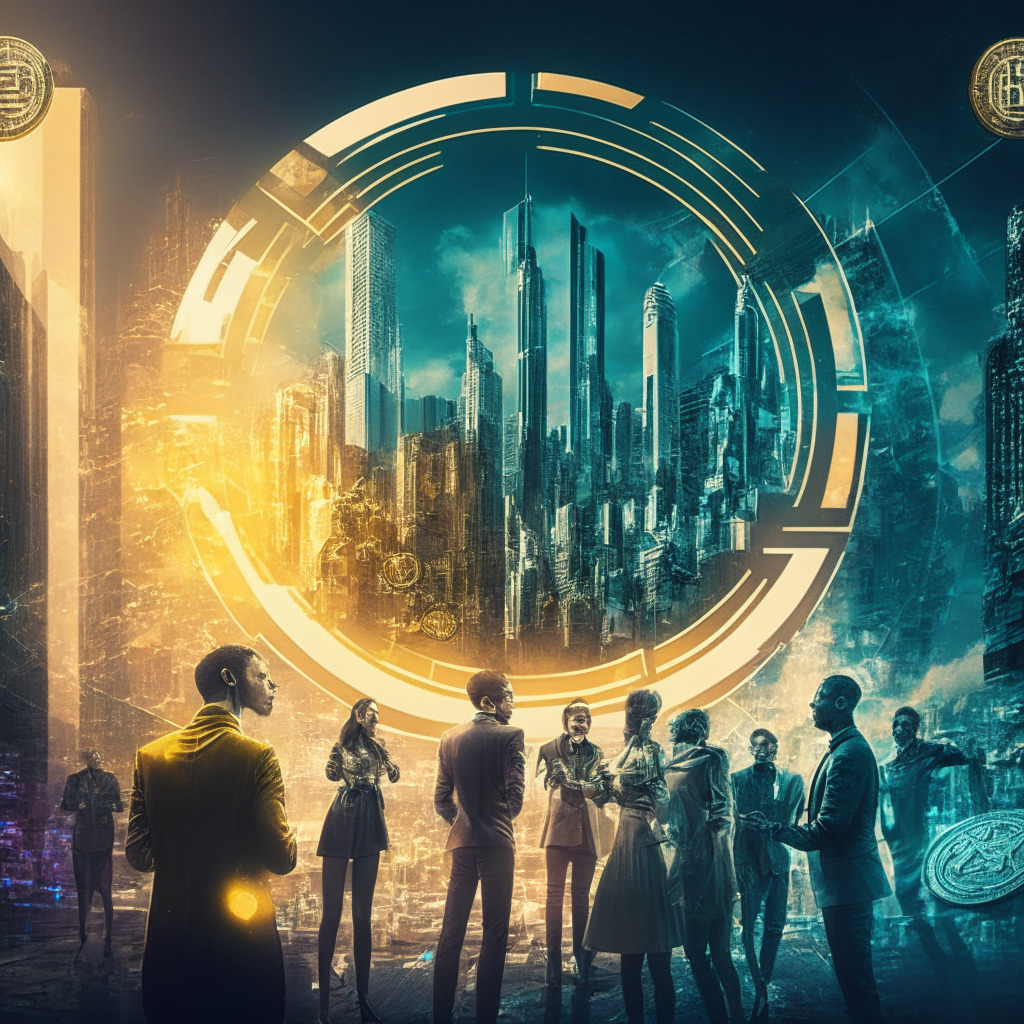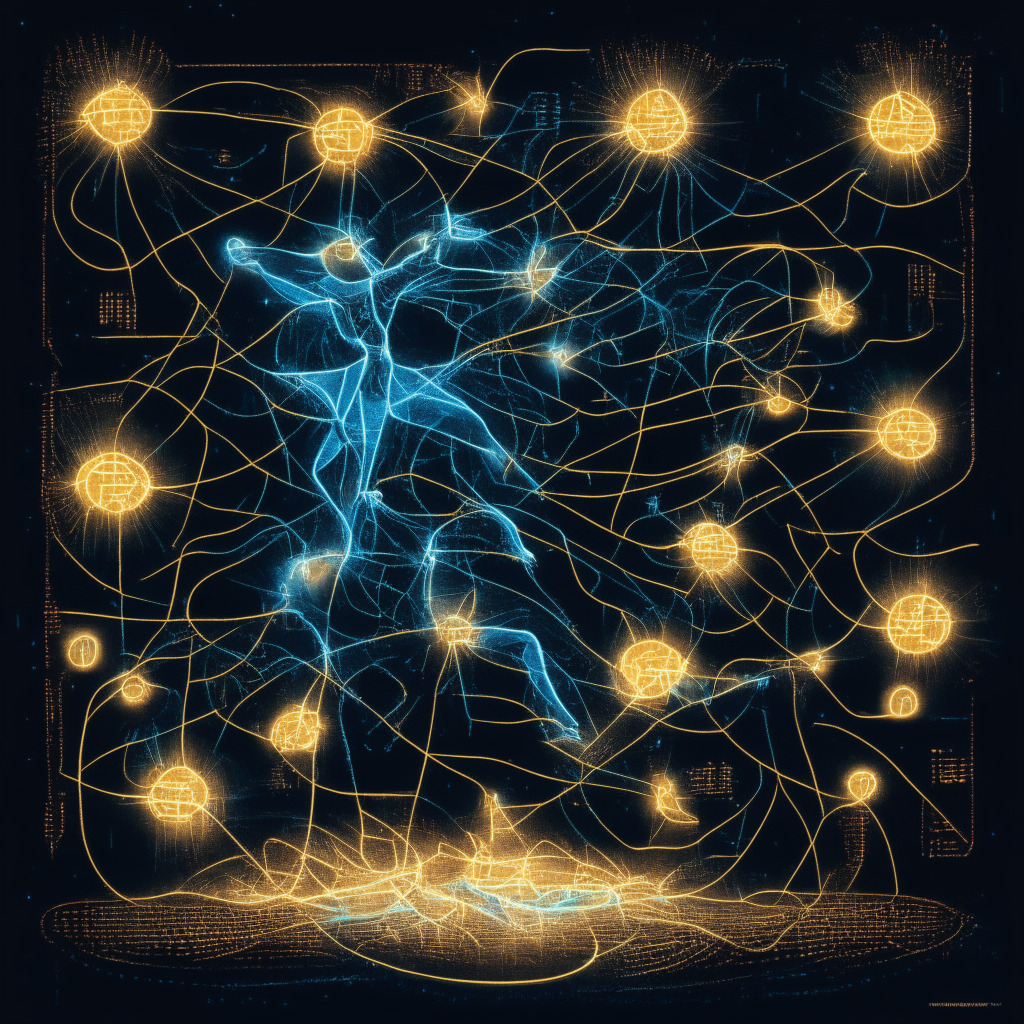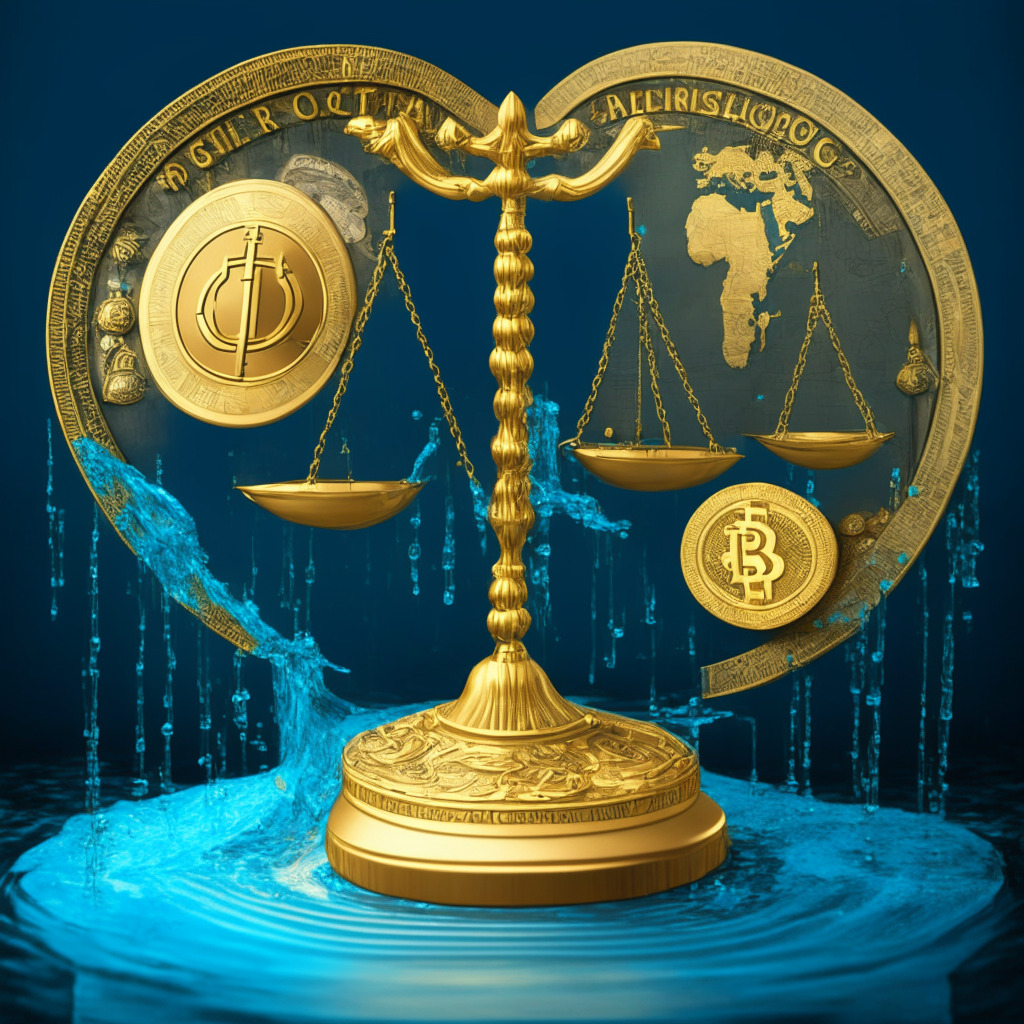Sam Altman’s Worldcoin, an ambitious crypto project aiming for financial inclusion and universal basic income implementation, is near securing $100 million in investments. However, concerns regarding data privacy and ethical implications of collecting biometric information raise questions on striking a balance between goals and potential risks.
Search Results for: Worldcoin
Worldcoin’s Billion-Dollar Valuation: Crypto Utopia, Privacy Risk, or Both?
Worldcoin, the crypto project led by OpenAI CEO Sam Altman, aims to raise $100 million in a new financing round, attracting investors with its vision of a universal digital currency distributed fairly using biometric iris scans. Despite controversy and concerns, Worldcoin continues gaining momentum in the crypto community.
AI’s ChatGPT Meets Crypto: Worldcoin, Iris Scanning, and Future Challenges
OpenAI’s Sam Altman is eyeing the crypto industry with Worldcoin, a globally-disruptive cryptocurrency using iris-scanning technology for secure identification. Amidst regulatory action and concerns surrounding user privacy, Worldcoin aims to reimagine transactions and identity verification while building trust in its security measures.
Worldcoin’s Ambitions: Global Financial Revolution or Just Another Crypto Cash Grab?
OpenAI’s Sam Altman is pushing to secure $100 million in funding for Worldcoin, a project aimed at creating a collectively owned, globally distributed cryptocurrency. With supporters touting its potential for financial inclusivity, skeptics question its real-world value and potential risks.
Optimism and Worldcoin Join Forces: Impact on Ethereum L2 Scaling and the Future of NFTs
The recent announcement of Optimism’s integration of World ID and World App on its Mainnet highlights the growing potential of Layer 2 (L2) scaling solutions for the Ethereum network. This partnership brings improved transaction confirmation times and lower costs for users, while emphasizing the increasing importance of L2 solutions in enhancing Ethereum.
Balancing Innovation and Regulation: The Cryptocurrency Dilemma in Government Oversight
“Sam Altman, leader of Worldcoin and OpenAI, discussed his concern about US government’s aggressive regulation of the cryptocurrency industry. While accepting the need for regulatory oversight, he criticized the government’s stern approach, arguing it stifles the potential of digital assets particularly Bitcoin (BTC), and highlighted the surveillance risks of Central Bank Digital Currencies (CBDCs).”
Optimism Network’s Major OP Tokens Private Sale: Economic Genius or Price Plunge Catalyst?
“Optimism Network plans to sell 116 million OP tokens via a private sale, expected to generate $160 million. The tokens are drawn from the unreserved portion of the OP token treasury and are subjected to a two-year lock-up period. This strategic approach aims at expanding Optimism’s market reach responsibly without affecting the token’s value.”
Gracy Chen’s Dual Approach: Championing Crypto Safety Amid an Evolving Digital Landscape
Gracy Chen, managing director of Bitget cautions about privacy concerns with Worldcoin tokens potentially exposing personal information. She advocates for maintaining skepticism in the dynamic crypto market while also acknowledging the opportunities found within the industry. With a balanced perspective, she deconstructs the complexities of the blockchain technology and digital currencies.
Noncustodial Liquidity Markets: Bridging Decentralized Finance with Seamless Lending & Borrowing
A Layer-2 network known as Base introduces noncustodial liquidity markets, changing the traditional ‘trust humans over algorithms’ dynamic. This innovation allows smart contracts to connect liquidity pools with borrowing strategies and promotes transparency. The Seamless Protocol enables streamlined undercollateralized borrowing, minimizing complexity and challenges usually associated with typical DeFi loans.
Blockchain and Cryptocurrencies: A Rising Force in West Africa Amid Economic Dissatisfaction and Potential Pitfalls
“Blockchain technology, particularly Bitcoin, is gaining traction in West Africa, thanks to education efforts and dissatisfaction with regional monetary policies. However, the journey towards adoption is filled with opportunities and potential pitfalls, emphasizing the need for careful navigation and robust education.”
The Digital Canvas Mourns While Crypto Regulation Tightens: A Week in Blockchain Review
“Cheems, the Shiba Inu who inspired countless memes and an NFT collection, sadly passed away. Governmental involvement in crypto continues, with Kenya probing Worldcoin and Somalia banning crypto-friendly messaging app Telegram. Individual Bitcoin miner successfully mined block 803,821, revealing competitiveness against mining pools.”
Navigating Innovation and Regulation in Crypto – A Global Odyssey
“The Argentine Agency for Access to Public Information is investigating Worldcoin’s data collection practices; Canadian authorities aim to improve storage of seized digital assets including NFTs; Coinrule recently launched its Marketplace driven by Generative Models. This crypto evolution requires a balance between innovation and regulation.”
The Hidden Dangers of AI-Powered Chrome Extensions: Your Convenience vs. Your Security
“According to Incogni, 69% of AI-powered extensions for Google Chrome present high-risk security threats in case of a breach. The study found that 59% of these extensions collect user data, with 44% harvesting personally identifiable information (PII). This underscores the importance of understanding the range of data shared with extensions and their ability to protect it.”
Regulatory Hurdles and Cryptographic Breakthroughs: A Dive Into the World of Digital Currency
The global payment powerhouse, PayPal, has introduced its Ethereum-based stablecoin, PYUSD, stirring up the digital currency landscape. Simultaneously, cryptographic activities like Sam Altman’s Worldcoin faces regulatory challenges in Kenya. Meanwhile, Curve Finance showcases resilience by recovering 73% of funds stolen in a recent hack. Despite occasional regulatory complexities, these developments affirm the dynamic growth in the cryptographic domain.
Navigating India’s Updated Data Protection Bill: BigTech’s Freedom vs Public Trust
India’s parliament has approved an update to the Digital Personal Data Protection Bill 2023, easing data compliance for tech giants. The Bill regulates data exports, with provisions for less stringent regulations on data storage, processing, and transfer. However, it’s still a topic of debate, as it potentially prioritizes tech advancement over robust data security.
Crypto Symphony: Week’s Highs and Lows from The World of Cryptocurrency
“This week, Bitcoin surged significantly and MicroStrategy plans to further boost its BTC coffers. Meanwhile, Tether marked a successful quarter, generating profits over $1 billion. Surprisingly, ETH 2,879 was rescued from a formidable hack thanks to an ethical hacker and Justin Sun. Volatility continues in the cryptocurrency market.”
Unpredictable Dance: Blockchain’s Global Developments and Regulatory Twists
These developments underscore an exciting time for blockchain technologies, highlighting the intricate dance between regulators and innovators. They illustrate the challenges that emerge in a rapidly evolving digital ecosystem. However, the future scope for blockchain seems expansive and unpredictable.
Binance Under Regulatory Siege: An Examination of Crypto Market Challenges and Future Solutions
“Binance, a top cryptocurrency platform, may be closing its US-based arm amidst regulatory pressures. CEO Brian Shroder opposes the shutdown due to its impact on exchange users. Meanwhile, Binance is expanding globally, emphasizing diversification and compliance with local regulations.]”
Global Ripple Effect of Crypto Regulations: Innovation versus Protection
The article focuses on recent developments related to crypto legislation, controversy surrounding Worldcoin’s data collection practices, Russia’s progress with a central bank digital currency, and Binance retracting its crypto custody license application in Germany. The central issue revolves around the challenge of balancing innovation and public protection in international blockchain regulation.
Unmasking the Court Chess: Legal Intricacies and Revelations in Blockchain and Crypto
“In the volatile world of digital currencies, former FTX CEO, Sam Bankman-Fried recently made headlines with his legal team’s request to seal privileged documents. This legal maneuver, where transparency clashes with privacy rights, could influence his $250-million bail application and carries implications for both personal privacy and broader market dynamics. Meanwhile, French data protection agency CNIL questions Worldcoin’s data collection, signaling privacy concerns in an increasingly blockchain and crypto-driven world.”
Unlocking the Future: Optimism’s Beam Wallet Redefines Crypto Transactions
“Step into the future with blockchain-based Beam wallet. This innovative application uses Twitter for login, eliminating the need to store seed words. Backed by top Web3 venture capitals, it aims to enhance user experience, increase adoption rate and ensure security by not landing passwords on a centralized server.”
The Blockchain Dance-Off: Optimism Outperforms Arbitrum in Transaction Volume Reversal
Optimism, a Layer-2 solution for Ethereum utilizing optimistic rollup technology, has surpassed its rival Arbitrum in terms of transaction volume for the first time in six months. This was largely driven by the launch of Worldcoin on Optimism and a reduction in transaction fees due to Optimism’s Bedrock upgrade. However, Optimism still trails Arbitrum considering the total value locked within contracts.
Optimism Surpasses Arbitrum in Daily Transactions: The Tale of Two Blockchains
“Blockchain layer-2 Optimism surpassed Arbitrum in daily transactions, largely thanks to the emergence of Worldcoin. Despite Optimism’s transaction rates, it trails in daily active wallets compared to Arbitrum. The competition between these two demonstrates the evolving nature and diverse directions of blockchain technology.”
Unraveling the Dynamics of Optimism’s Upcoming Token Release: Impact and Resiliency in Flux
Layer-2 blockchain, Optimism, is set to release $36 million worth of tokens, a move that previously triggered a temporary price decrease in its OP token. Despite initial fluctuations, year-to-date performance established a strong 67% growth, with operational decisions offering dynamic investment evaluations.
Navigating the Tempest: Unraveling BTC’s Bearish Cycle, Regulatory Uncertainty, and Novel Crypto Projects
As Bitcoin hobbles into a bearish cycle breaching a solace sight unseen for a month at $29,000; investor anxieties increase in light of the Federal Reserve’s impending rise in interest rates. Crypto markets fluctuate alongside the scrutiny of novel crypto projects and potential repercussions of regulatory uncertainty, illustrating a web of factors shaping the crypto industry.
The Crypto Rollercoaster: Market Fluctuations, Emerging Cryptos, and Retina Scans in Play
The cryptocurrency market is currently experiencing a minor descent, anticipating the Federal Reserve’s interest rate announcement. Sam Altman’s new Worldcoin employs retina scans to counteract AI-developed synthetic identities. Despite the market’s decline, Flex Coin, Evil Pepe Coin, ApeCoin, Burn Kenny, and The Graph highlight their strong potential due to robust fundamentals and positive technical analysis.
Ethereum’s Vitalik Buterin Deliberates Over Human Identity Verification Systems and their Role in Blockchain Security
Ethereum Co-founder Vitalik Buterin responds to Worldcoin’s launch of a decentralized human identity verification system, viewing it as integral in tackling online spam and power centralization. Buterin also stresses the need for privacy, accessibility, transparency, and security in such identity solutions to prevent wealth concentration in potentially hostile hands. Despite potential threats to privacy and system security, Buterin promotes hybrid approaches to proof of personhood, warning of a future intertwined with AI and the need for careful blockchain navigation.
Navigating the Evolving Crypto Landscape: A Look at Advances, Risks, and Regulations
“The landscape of cryptocurrency rapidly evolves, manifesting in technology, investment, regulation, and associated crime. With rising crypto-related crimes, there’s increased necessity for enforcement teams like NCET. Conversely, blockchain’s advancements, like the Wormhole Gateway, broaden accessibility within the industry. Amid these changes, careful due diligence is crucial.”
A Rough Patch in the Crypto Realm: The Dip in VC Funding for Web3 Startups and the Rising Hope
Crunchbase reports indicate a 76% drop in funding for Web3 startups from VC funds in Q2 compared to last year. This year’s tally stands at $3.6 billion, a 78% downturn from 2022’s $16 billion. Despite this drop, AI startups continue to attract investors, while certain Web3 initiatives manage to secure impressive funding amidst the downturn.
AI Content Cannibalism: The Curse of Model Autophagy Disorder and Hope Beyond
The phenomenon of ‘Content Cannibalism’ in Artificial Intelligence is dampening its credibility, leading to a decay in output quality. Sam Altman of OpenAI suggests maintaining quality by prioritizing human content. High-profile AIs like Bill Gates argue for a measured approach, managing potential AI risks.
GPU Shortage as a Catalyst for Web3: How Decentralized Infrastructure Networks Benefit AI Startups
The GPU shortage could accelerate the adoption of Web3 by mainstream thanks to decentralized physical infrastructure networks (DePIN). Protocols like Akash, enabling GPU leasing to AI start-ups, and Arweave, offering permanent data storage, could help alleviate resource issues. DePIN could provide inexpensive, reliable infrastructure for startups, shielding them from AI threats and offering advantages over Web2.
AI and Crypto Synergy: Unlocking Transparency, Decentralization, and User Control
The integration of AI and crypto has the potential to revolutionize both industries, fostering greater transparency, user control, and decentralization. Industry insiders suggest that AI could open up new opportunities for the blockchain sector, driving its resurgence and bringing additional real-world use cases.































